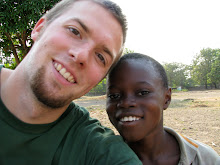It was classic Guinea. Our battered, sputtering excuse for a taxi
chugged to a halt, spewing exhaust and a wave of noxious fumes. I
groaned, looking at my watch and wondering why, oh why, the bush taxi gods loved toying with ex-Volunteers like me.
I was on my last leg of the long bush taxi trip from Bamako, Mali, to
my village and home of two years-- Boulliwel. The Peace Corps had
evacuated Guinea and I, having processed all my paperwork and tied up
my administrative loose ends, had decided to return to the country to
say goodbye to my friends and neighbors and get some closure on my experience there. I had been hoping to have a painless, mechanically-sound trip back in, but alas, it was not to be.
The driver, a teenage boy named Abdoulaye, opened the hood and began tinkering with some of the wires surrounding the grime-covered
battery.
"Hey-- Barry." He gestured to his apprentice, another teenage boy.
"Grab those jugs and go get some water from the stream."
My Pular proficiency allowed me to understand many things now--
sometimes, though, I had a hard time believing my ears.
"He's going to get water from the stream?!" I asked Abdoulaye, incredulous.
"Yup!" Abdoulaye said, tightening a nut and stepping back to take a
better look at the engine. "The tubes get really hot. He'll get some
water and pour it on here and we'll be good to go."
I was terrified.
You'd think two years of service in a country like Guinea-- including
regular, weekly bush taxi rides-- would have desensitized me to the
lunacy of public transportation in Africa. Yet here I was, stuck on
the side of the road in the misting rain, watching two boys mess with
the bird's nest of wires and tubes under the hood of their Opal
junker, and I was--once again-- terrified.
Barry brought back a couple jugs of water, which Abdoulaye carefully
poured down a steaming black tube. The water spurted out a hole in
the other end-- apparently this was normal. After about five minutes
of this, Abdoulaye stood up, looked at me, and gestured me to get back
into the car.
"We're good!" He slammed the hood and climbed in the driver's side.
I opened the passenger door gingerly, muttering prayers.
We got going, chugging up the hill away from the stream, and
eventually rattled into Boulliwel 30 minutes later, amazingly,
inexplicably, in one piece. Thank the Lord!
This was the price-- a very reasonable one, all things considered-- of
getting to see my Boulliwel friends again before leaving the country.
What a joyful reunion it was! I arrived after dark, trudging up to
the Diallos' porch after a long day in the car, and was received with
warm embraces and a few scattered "bisous," those awkward French
cheek-kisses that never quite seem as firm or satisfying as a good
solid handshake.
It was wonderful to see everyone again, to sit and reconnect, to make
the rounds and greet the neighbors. All in all, I spent four days
back in Boulliwel, drinking tea, gathering up my stuff, handing out
presents, and inevitably talking about the situation the country is
in.
Things up-country are calm, if troubled. Everyone denounced the
military junta, calling them bandits and criminals, yet there was the
general feeling as well that there was little they could do to change
the way things were. It hurt me to know that while I had a plane
ticket home in my bag, these folks WERE home. They had nowhere to go if things got worse.
People seemed to understand, however, our reasons for leaving. I got
many pats on the shoulder and words of encouragement: "You're right--
head home 'til it gets better. It's not good for you here now."
Tears were shed. Saying goodbye was hard, in some cases. I had a
final dinner with the missionaries in Dalaba, who I've become very
close to, and promised to keep in touch. One old man, Elhadj
Ibrahima, who I found sick in bed, started crying while clutching my
hand, telling me to come back when the country becomes more peaceful.
Kids small and tall came knocking at all hours, some looking for
"porto" handouts and others wanting my address and phone number so we
can keep in touch. Apparently Mom has already started getting random
calls-- "Allo- André? André?"
In all, it was a really great trip. Things seem calm outside of
Conakry, but we will all continue to watch the situation with great
care. I hope to keep in as good touch as I can considering the
conditions.
In the meantime, I'm currently in Casablanca, Morocco, visiting some
old friends from camp who teach at a school here. Morocco-- fabulous
place-- has treated me well. I've ridden camels in the Sahara, hiked
in the Atlas mountains, and eaten heaping mounds of delicious couscous
and tajine.
I plan on heading home on Thursday, the 19th-- well in time for
Thanksgiving turkey and the Lions on tv;). From there, I'll be in the
Boston area for a few weeks until heading down to Greensboro, NC, to
be closer to my fiançée, René. More on this soon.
We are thus nearing the end of our "Andrew in Africa" emails! Thanks
for reading and for being interested in what's happening halfway
across the world.
Much love,
Andrew


